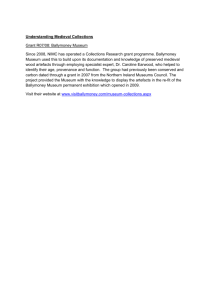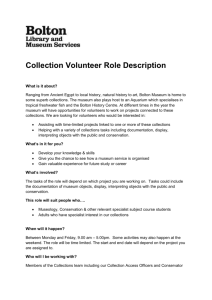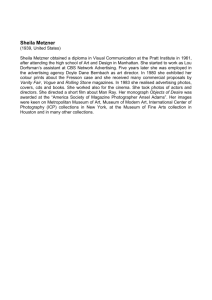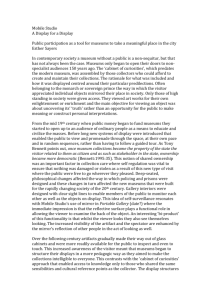6 Crescent Gardens, Belfast, Northern Ireland, BT7 1NS Tel: +44 (0
advertisement
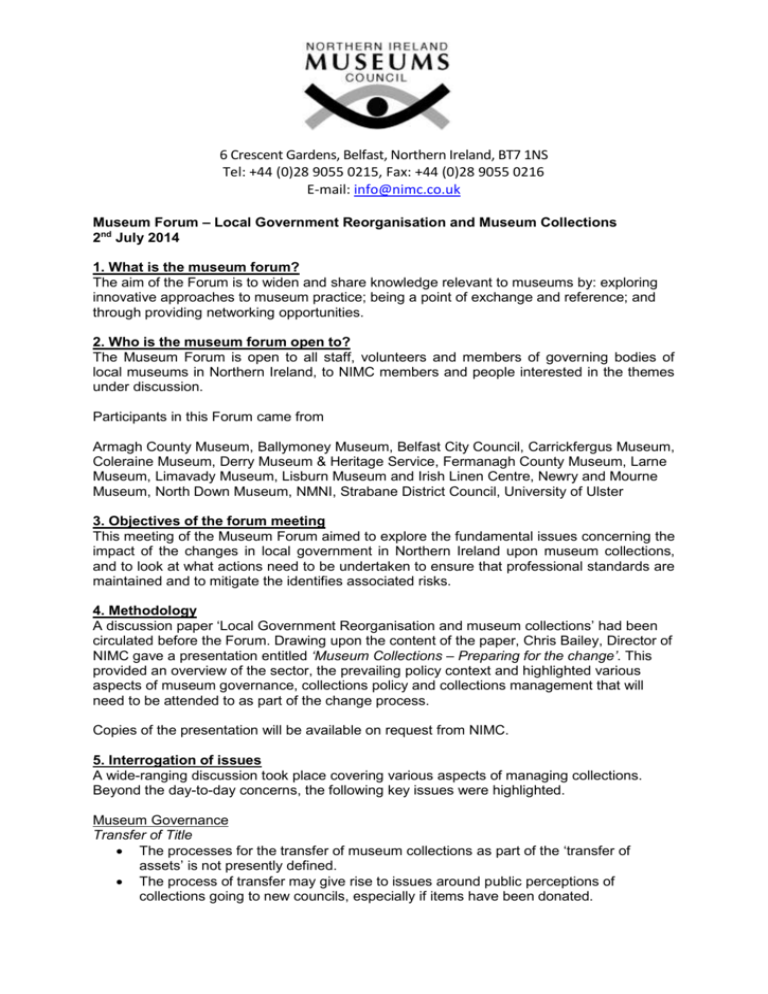
6 Crescent Gardens, Belfast, Northern Ireland, BT7 1NS Tel: +44 (0)28 9055 0215, Fax: +44 (0)28 9055 0216 E-mail: info@nimc.co.uk Museum Forum – Local Government Reorganisation and Museum Collections 2nd July 2014 1. What is the museum forum? The aim of the Forum is to widen and share knowledge relevant to museums by: exploring innovative approaches to museum practice; being a point of exchange and reference; and through providing networking opportunities. 2. Who is the museum forum open to? The Museum Forum is open to all staff, volunteers and members of governing bodies of local museums in Northern Ireland, to NIMC members and people interested in the themes under discussion. Participants in this Forum came from Armagh County Museum, Ballymoney Museum, Belfast City Council, Carrickfergus Museum, Coleraine Museum, Derry Museum & Heritage Service, Fermanagh County Museum, Larne Museum, Limavady Museum, Lisburn Museum and Irish Linen Centre, Newry and Mourne Museum, North Down Museum, NMNI, Strabane District Council, University of Ulster 3. Objectives of the forum meeting This meeting of the Museum Forum aimed to explore the fundamental issues concerning the impact of the changes in local government in Northern Ireland upon museum collections, and to look at what actions need to be undertaken to ensure that professional standards are maintained and to mitigate the identifies associated risks. 4. Methodology A discussion paper ‘Local Government Reorganisation and museum collections’ had been circulated before the Forum. Drawing upon the content of the paper, Chris Bailey, Director of NIMC gave a presentation entitled ‘Museum Collections – Preparing for the change’. This provided an overview of the sector, the prevailing policy context and highlighted various aspects of museum governance, collections policy and collections management that will need to be attended to as part of the change process. Copies of the presentation will be available on request from NIMC. 5. Interrogation of issues A wide-ranging discussion took place covering various aspects of managing collections. Beyond the day-to-day concerns, the following key issues were highlighted. Museum Governance Transfer of Title The processes for the transfer of museum collections as part of the ‘transfer of assets’ is not presently defined. The process of transfer may give rise to issues around public perceptions of collections going to new councils, especially if items have been donated. It is likely that museums will be expected to take custody of civic collections from the ‘old’ councils, how will this correspond with museums’ collections policies. Council staff need to be made aware of the value of the records and files currently held, so that they may appropriately be transferred to the local museum, to the Public Record Office of Northern Ireland, or disposed of. Insurance The need to ensure that the necessary insurance is in place to cover the change process. Heritage Assets Will Councils implement Financial Reporting Standard 30 concerning Heritage Assets, and if so will some form of valuation of museum collections be required? How will the associated matters of cost, process, timescale and ensuring that any valuation is carried out by persons with the necessary expertise be addressed? Loans In light of the variation in the amount of loans in place across museums, clarity is required on the scale of the review of the bilateral loan agreements and who will be responsible for undertaking this review. Collections Policy Collections Development Policies All council-run museums define their collecting focus geographically, which will require amendment due to the changes in council boundaries. Getting agreement on a new collections development policy will take time as it is likely that museums will be ‘down the list’ of priorities for the new councils. No timeframe for approval of new structures or forward plans. Forward Planning There is a lack of certainty regarding the way in which museums will contribute to the forward plans of the new Councils before April 2015. Similarly, the structures are not in place which will allow museums to gain the necessary approvals for policies and documents required for the Museum Accreditation process. Transfer of records Some amalgamations will see museums coming together which use different documentation and collections management software. How will the transfer be managed? How should future records management be planned for? How will the collections that are available on-line be treated? Rationalisation The rationalisation or disposal of collections is not considered a primary issue. Collections Management Housekeeping With the likelihood of changes in staffing structures, how can we ensure that the museums retain staff with the necessary skills and expertise in the care and management of collections? Storage It is generally acknowledged that there is a shortage of museum storage space, but the scale of the problem is not quantified. The amalgamation of councils could give rise to the sharing and consolidation of museum storage. Documentation While collections documentation is considered a priority (an ‘area for improvement’ for 95% of Accredited museums), it is not being addressed. How will the matter of different documentation software being used within a museum service be tackled? Security The lack of access to specialist experts will remain after the change in local government. Emergency Planning While recognised as importance, museum emergency plans have not yet been reconsidered in light of the new council structures. General During the discussion on the current issues associated with museum collections and the reorganisation of councils, the following points were made, While there is presently a lack of clarity on the corporate planning processes and the new service structures, there was no better time to get these issues on the change agenda. Within those councils that will operate a museum service based on extant museums, there are significant opportunities to seek collaborative solutions to issues NIMC has an important role in catalysing the sectoral approach to a tackling the issues and promoting the museum agenda to the new councils. There is a concern that as staff structures are altered, there is a loss of collections specialists within councils. The requirement to adhere to the prevailing standards and code of ethics should be highlighted within the change process. 6. Suggestions for actions to address these issues Museum Governance Transfer of Title Each museum to review its documentation, collection inventory and listing of nonaccessioned items by way of informing the transfer of assets between the old council and the new one. Audit the existing civic collections and seek clarity on what will transfer to the museum service. Communicate with donors, as appropriate, to inform them of the transfer of objects to the new body. Museum staff and NIMC will highlight the need to purposefully consider the heritage value and the destination of the records and files currently held by councils. Heritage Assets Establish if the Heritage Assets listing is a requirement within the Council’s procedures. Check on the thresholds for inclusion on asset listings (some organisations only list items above a particular value). Assess the accuracy of inventories and documentation. As required, plan for the valuation of items. Loans Local museums to review the loans agreements between museums and lenders in order to update the legal entities that are party to the loan, and make any adjustments concerning the display, acknowledgement and term of the loan. Collections Policy Collections Development Policies Both NIMC and the individual museums to raise awareness of Collections Development Policy within forward planning and the need to review the scope of such policies within the Museum Accreditation timescales. At some later stage, museum staff will need to prepare the rationale for dealing with ‘duplicates’ across merged collections (for example, two objects may be the same but have different stories or be connected to different people or places). NIMC to offer support to the corporate planning process of new councils Transfer of records As the scope and scale of the issues regarding the compatibility of documentation and collections management software across ‘merged’ services will vary from place to place, each service will need to identify the requirements for achieving standardisation within the service and have them incorporated into the council’s broader IT forward plan. NIMC will examine the prospect of holding a mini-conference on documentation and collections management software Collections Management Storage Each museum to review its storage provision by way of informing the corporate planning process and making the case for collections storage to the new council. Documentation As this is an endemic issue, not consequential to change in local government, but which will directly affect the new museum services, NIMC will examine the options for a sector-wide approach to addressing documentation backlogs. General NIMC will work with other organisations (eg NILGA and NMNI) to provide insights and guidance to new Councillors on the operation of a museum service and its social, cultural and economic value. The means and approach to tackling the identified issues will vary from one council area to another, and each museum service will need to find the most appropriate solutions. NIMC will provide support and information, particularly around the options taken across the sector, so that museums have ‘answers ready to hand’ and to inform local advocacy and planning. Museums feel that they have a moral responsibility to hand over collections and assets in the best possible condition. 7. Date of next Forum meeting The next forum meeting will be held in Dec 2014.
